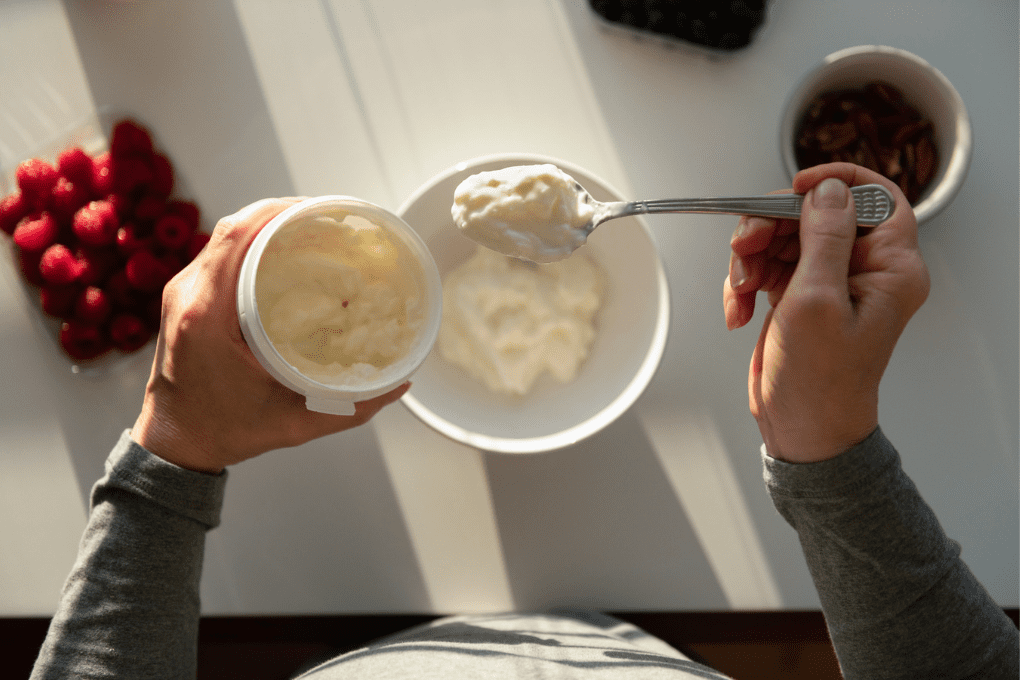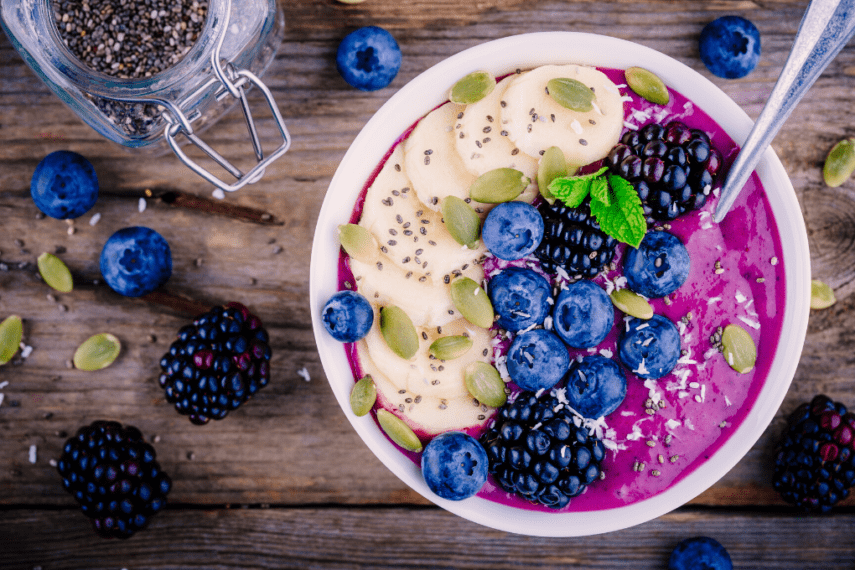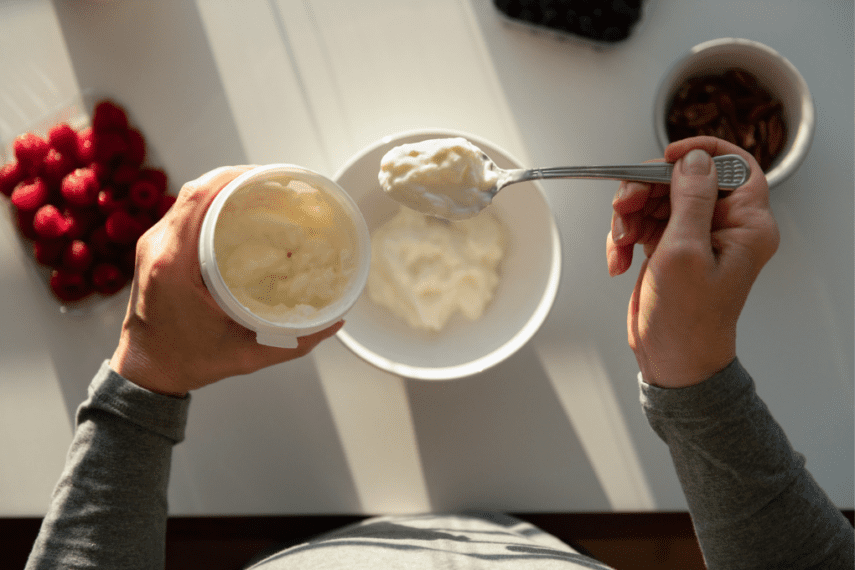
If you’ve been wondering, “does dairy cause inflammation?”, we’re here to set the record straight.
Certain foods have gotten a bad reputation in the media for allegedly causing inflammation in the body. Dairy products are some of the main targets of this misinformation regarding inflammation.
While dairy foods such as milk and cheese may have been linked to inflammation in the past, current research supports that dairy products do not cause inflammation in most people. In fact, dairy products can actually be a component of an anti-inflammatory diet.
This article serves to bust the dairy inflammation myth, once and for all.
What to Know About Dairy and Inflammation
Inflammation is the body’s natural immune response to an injury or infection. There are two types of inflammation: acute and chronic.
Acute inflammation is a short term immune response, such as when you cut your finger. The body sends white blood cells and other inflammatory biomarkers to the area, causing symptoms such as redness, swelling, and heat. Acute inflammation is temporary and subsides once the injury or illness is taken care of.
Chronic inflammation lasts for much longer – for several months up to several years. Certain diseases and conditions are linked to chronic inflammation, including:
- Diabetes
- Allergies
- Arthritis
- Cardiovascular disease
- Chronic Obstructive Pulmonary Disease
- Inflammatory Bowel Disease
Some symptoms of chronic inflammation are pain, fatigue, insomnia, weight gain, weight loss, gastrointestinal issues, and more.
With certain conditions such as a milk protein allergy or lactose intolerance, inflammation from dairy products may occur. But for most healthy people without these conditions, there is no strong evidence for dairy causing inflammation in the body.
A note on milk protein allergies and lactose intolerance: Lactose intolerance occurs when you have a lactase deficiency. It is not the same as an allergy to dairy.
Lactose intolerance is a digestive condition related to the sugar in dairy foods that can cause mild gastrointestinal symptoms. A dairy or milk allergy is an immune response to the protein in dairy products that can cause life-threatening symptoms.
Lactose intolerance is an individualized condition. Most people can still enjoy dairy foods by drinking lactose-free cow’s milk and choosing natural cheeses and yogurts.
There is actually a lot of research to show that dairy products may help reduce inflammation.
Here are some findings from several dairy inflammation studies that report potential health benefits of eating dairy:
- Diets that include dairy are associated with improved bone health and reduced risk of fracture (1).
- Consumption of dairy products throughout the lifespan is linked to lower risk of certain diseases like diabetes and cardiovascular disease (2).
- Fermented dairy products like yogurt and kefir may favorably alter the gut microbiome (3).
How Do You Know if Dairy is Causing Inflammation?
As mentioned above, people with certain conditions like a milk protein allergy or lactose intolerance may experience an inflammatory response when consuming dairy products.
Some common signs that dairy may be contributing to inflammation include:
- Digestive issues (bloating, gas, constipation, diarrhea)
- Acne
- Acid reflux
- Eczema
If you experience any of these symptoms or suspect you have a dairy allergy or intolerance, speak with your doctor about diagnosis and treatment.
Can Dairy Products Cause Inflammation?
When it comes to dairy products and inflammation, not all types are created equally. Milk, cheese, yogurt, and butter each have their own unique anti-inflammatory benefits and purposes in the diet.
Milk and Inflammation
Milk is an affordable and widely available dairy product. It provides 13 essential nutrients including calcium, potassium, selenium, zinc, and Vitamins A, D, and B12. An 8-ounce serving of milk also provides 8 grams of high quality protein.
Lactose-free cow’s milk contains the same 13 essential nutrients, including calcium, protein, and vitamin D, as regular cow’s milk, just without the lactose.
If you’ve been wondering “is milk good for inflammation?”, research shows low-fat dairy consumption, including milk, has been associated with lower risk of Type 2 Diabetes and cardiovascular disease (4).
Prefer whole milk? A review of observational studies shows that consumption of high-fat dairy does not necessarily increase the risk of cardiovascular disease, in the context of a normal dietary pattern (5).
Since both of these diseases can contribute to chronic inflammation, it may be beneficial to consume milk and other dairy products to help prevent them.
Cheese and Inflammation
Is cheese inflammatory? The answer might surprise you! The media portrays a relationship between cheese and inflammation largely due to its cholesterol-rich saturated fatty acid content.
However, many cheeses possess beneficial fats, too. In particular, a polyunsaturated fatty acid called conjugated linoleic acid (CLA) may have anti-inflammatory benefits (6).
Studies show that cheeses that have CLA, such as pecorino and goat cheese, may reduce inflammatory biomarkers and raise “good” HDL cholesterol levels. These are promising results for those at risk of cardiovascular disease (7, 8).
Additionally, cheese is rich in microbial diversity, because it is a fermented food. This is potentially beneficial for gut health (9).
Yogurt and Inflammation
Is yogurt good for inflammation? As a probiotic and protein-rich food, yogurt has several health benefits in relation to reducing inflammation.
Studies have consistently shown that consuming probiotic-rich yogurt can lower inflammatory biomarkers. This has positive implications for people with diseases associated with chronic inflammation, including Inflammatory Bowel Disease and diabetes (10, 11).
For those with Type 2 Diabetes, there is also promising research that yogurt may aid in the reduction of HbA1c, a measurement of long term blood sugar control (12).
Butter and Inflammation
Is butter inflammatory? Because butter contains a high amount of saturated fat, it’s long been considered a no-no on an anti-inflammatory diet.
Contrary to popular belief, a systematic review and meta-analysis of prospective studies found a tablespoon of butter per day is not associated with cardiovascular disease, coronary heart disease, or stroke.
Additionally, butter contains Branched Chain Fatty Acids (BCFAs), which are types of fatty acids that make up about 2% of dairy fat.
While there is still a lot of research needed, animal studies show promising results regarding the health benefits of BCFAs, including reducing inflammation and preventing certain diseases and metabolic disorders (13).
Can You Eat Dairy on an Anti-Inflammatory Diet?
Dairy can absolutely be part of an anti-inflammatory diet, and for most people, it should be.
Eating dairy on an anti-inflammatory diet helps you meet your nutrition needs, because dairy products are a good or excellent source of several essential nutrients, including:
- Protein
- Calcium
- Vitamin A
- B vitamins, including vitamin B12
- Vitamin D
- Potassium
In fact, some of the most well-researched anti-inflammatory diets include and encourage dairy consumption. The Mediterranean diet, which emphasizes mostly plant-based foods, includes dairy products like feta cheese and Greek yogurt.
The DASH Diet, a low salt diet created to help lower high blood pressure, is similar to the Mediterranean diet. On the DASH diet, moderate consumption of low-fat dairy products are encouraged, including yogurt and cheese.
Bust the dairy inflammation myth in your own kitchen: check out some dairy-full real delicious recipes that fit perfectly within an anti-inflammatory diet. Try this turmeric latte or yogurt carrot soup.
So, Is Dairy Inflammatory?
Research overwhelmingly supports that dairy does not cause inflammation in most individuals. Dairy and inflammation appear to be linked only in certain instances, such as when a person has a milk protein allergy or lactose intolerance.
In actuality, dairy products may have anti-inflammatory properties due to unique nutritional components. Including dairy is a smart choice when following an anti-inflammatory diet because it provides valuable nutrients like calcium and vitamin D.
Dairy products have several health benefits including promoting bone health and building and maintaining muscle. Dairy deserves a spot on your plate.
References:
1. Rizzoli R. Dairy products, yogurts, and bone health. Am J Clin Nutr [Internet]. 2014 [cited 2023 Nov 8];99(5):1256S-1262S. Available from: https://pubmed.ncbi.nlm.nih.gov/24695889/
2. Gil Á, Ortega RM. Introduction and executive summary of the supplement, role of milk and dairy products in health and prevention of noncommunicable chronic diseases: A series of systematic reviews. Adv Nutr [Internet]. 2019 [cited 2023 Nov 8];10(suppl_2):S67–73. Available from: https://pubmed.ncbi.nlm.nih.gov/31089742/
3. Aslam H, Marx W, Rocks T, Loughman A, Chandrasekaran V, Ruusunen A, et al. The effects of dairy and dairy derivatives on the gut microbiota: a systematic literature review. Gut Microbes [Internet]. 2020;12(1):1799533. Available from: http://dx.doi.org/10.1080/19490976.2020.1799533
4. Alvarez-Bueno C, Cavero-Redondo I, Martinez-Vizcaino V, Sotos-Prieto M, Ruiz JR, Gil A. Effects of milk and dairy product consumption on type 2 diabetes: Overview of systematic reviews and meta-analyses. Adv Nutr [Internet]. 2019 [cited 2023 Nov 8];10(suppl_2):S154–63. Available from: https://pubmed.ncbi.nlm.nih.gov/31089734/
5. Kratz M, Baars T, Guyenet S. The relationship between high-fat dairy consumption and obesity, cardiovascular, and metabolic disease. Eur J Nutr [Internet]. 2013;52(1):1–24. Available from: http://dx.doi.org/10.1007/s00394-012-0418-1
6. Lordan R, Zabetakis I. Invited review: The anti-inflammatory properties of dairy lipids. J Dairy Sci [Internet]. 2017;100(6):4197–212. Available from: https://www.sciencedirect.com/science/article/pii/S0022030217302588
7. Sofi F, Buccioni A, Cesari F, Gori AM, Minieri S, Mannini L, et al. Effects of a dairy product (pecorino cheese) naturally rich in cis-9, trans-11 conjugated linoleic acid on lipid, inflammatory and haemorheological variables: A dietary intervention study. Nutr Metab Cardiovasc Dis [Internet]. 2010;20(2):117–24. Available from: https://www.sciencedirect.com/science/article/pii/S0939475309000660
8. Santurino C, López-Plaza B, Fontecha J, Calvo MV, Bermejo LM, Gómez-Andrés D, et al. Consumption of goat cheese naturally rich in omega-3 and conjugated linoleic acid improves the cardiovascular and inflammatory biomarkers of overweight and obese subjects: A randomized controlled trial. Nutrients [Internet]. 2020 [cited 2023 Nov 8];12(5):1315. Available from: https://www.mdpi.com/2072-6643/12/5/1315
9. Leeuwendaal NK, Stanton C, O’Toole PW, Beresford TP. Fermented foods, health and the gut microbiome. Nutrients [Internet]. 2022 [cited 2023 Nov 8];14(7):1527. Available from: https://www.mdpi.com/2072-6643/14/7/1527
10. Mousavi SN, Saboori S, Asbaghi O. Effect of daily probiotic yogurt consumption on inflammation: A systematic review and meta-analysis of randomized Controlled Clinical trials. Obes Med [Internet]. 2020;18(100221):100221. Available from: https://www.sciencedirect.com/science/article/pii/S2451847620300415
11. Shadnoush M, Hosseini RS, Mehrabi Y, Delpisheh A, Alipoor E, Faghfoori Z, et al. Probiotic yogurt affects pro- and anti-inflammatory factors in patients with inflammatory bowel disease. Iranian Journal of Pharmaceutical Research : IJPR. 2013;12(4):929.
12. Mohammad-Shahi M, Veissi M, Haidari F, Shahbazian H, Kaydani G-A, Mohammadi F. Effects of probiotic yogurt consumption on inflammatory biomarkers in patients with type 2 diabetes [Internet]. Vol. 4, BioImpacts : BI. Tabriz University of Medical Sciences; 2014 [cited 2023 Nov 8]. p. 83. Available from: http://dx.doi.org/10.5681/bi.2014.007
13. Taormina VM, Unger AL, Schiksnis MR, Torres-Gonzalez M, Kraft J. Branched-chain fatty acids—an underexplored class of dairy-derived fatty acids. Nutrients [Internet]. 2020 [cited 2023 Nov 8];12(9):2875. Available from: https://www.mdpi.com/2072-6643/12/9/2875/htm



